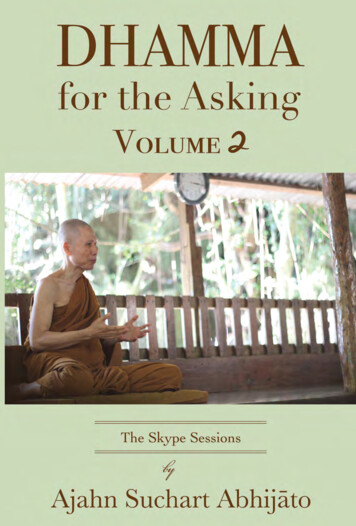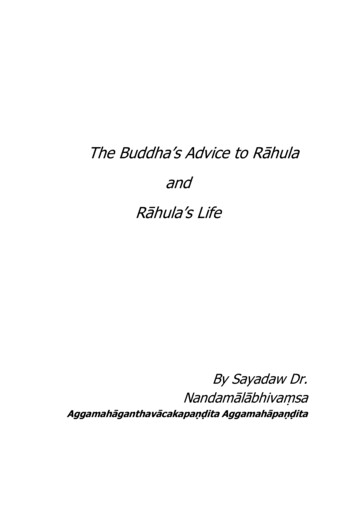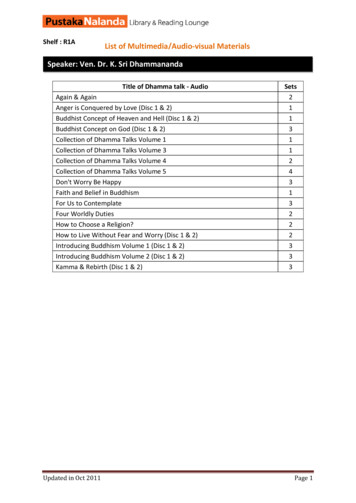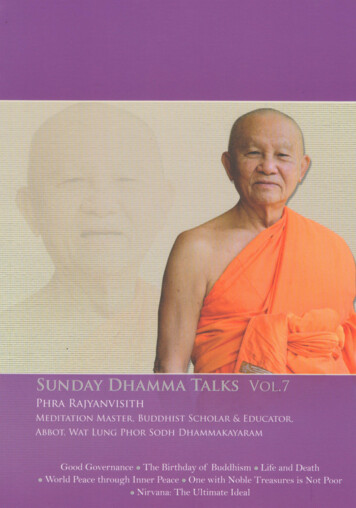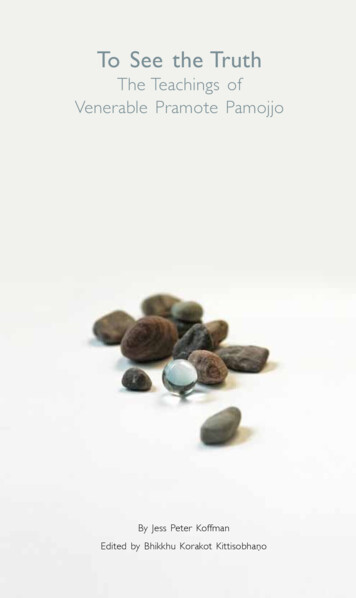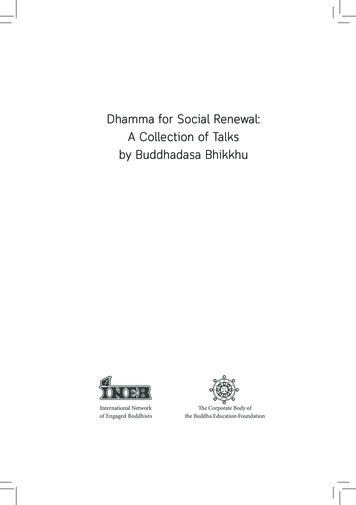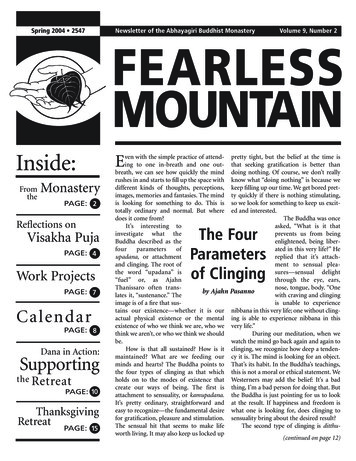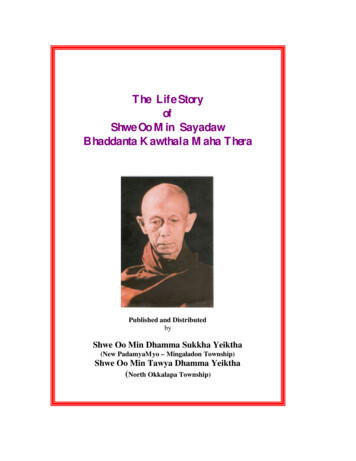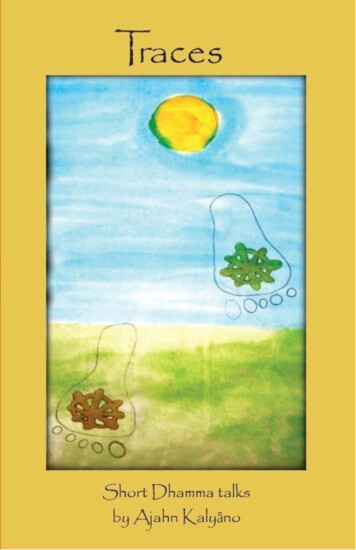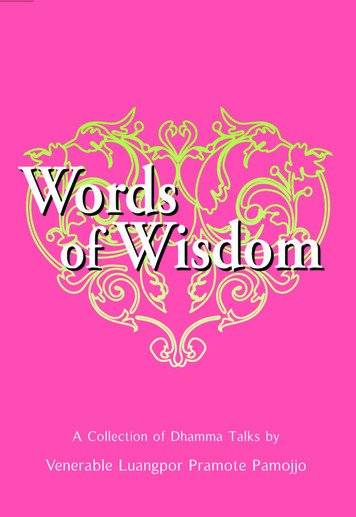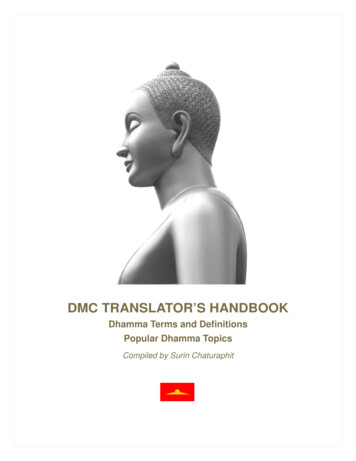
Transcription
DMC TRANSLATOR’S HANDBOOKDhamma Terms and DefinitionsPopular Dhamma TopicsCompiled by Surin Chaturaphit
DMC TRANSLATOR’S HANDBOOKPart I -- Dhamma Terms, Definitions and ReferenceMaterialPart II – Popular Dhamma Topics1.2.3.4.5.6.7.8.9.10.11.BuddhismThe Buddha’s LifeThe Teachings of the Buddha- The Four Noble Truths (Noble Truths of Suffering)- The Noble Eightfold Path (the Path to end suffering)- The Three Characteristics of Life- Paramis --Ten Perfected Virtues- Sammadhitti -- Right View- Khandha 5 -- Five Aggregates- Kusalakammapada 10 -- Tenfold Path of Wholesomeness- Brahmavihara 4 -- The Four Lofty States of Mind- Hiri-ottapa -- Shame and Fear of Wrongdoing- Pancadhamma -- The Five Virtues- Iddhipada 4 -- Four Foundations of Success- Wrong LivelihoodDiscipline for MonasticsThe Five PreceptsThe Eight PreceptsMeritsGenerosityMeditationHow to MeditateDhammakaya Meditation2
Dhamma Terms andDefinitions3
DHAMMA TERMS & DEFINITIONSCompiled by Surin ChaturaphitRevised June 8, 2011กกตัญ ูgratefulกตั ู ูกตเวทีthe quality of being a grateful person;gratefulness; one who is thankful for thebenefits received and reciprocates themกตเวทีone who reciprocates favors receiveedกตัตตReserve Kamma; minor kamma or casual actsthat are not serious, or are committed กuniversal lawกฎแห งกรรมLaw of Kamma; Law of Karma; Law of Causeand Effect; Law of Actionกฐิน(kathina) the Kathina ceremony; annual robepresentation ceremony; robe offering ceremony;robe offering.-- Kathina is the wooden frame which monks inancient India used to sew their clothes on. Theclothes thus prepared came to be known asKathina clothes or Kathina robes. The event inwhich the robes are offered to the monks isknown as the Kathina Ceremony or RobeOffering Ceremony. To complete the ceremonyit is required that at least five monks are presentto represent the Sangha, the community ofmonks. Offering of robes by laypeople to themonks is a way to express gratitude to themonks and an act of support for the religion.4
The event begins after Buddhist Lent andcontinues for one month.กรรมkamma; karma; action; deed; willed action; anintentional action that has futureconsequences, including future rebirths; theconsequence of one’s actions of body, speechand mind; the consequences of past deedslargely determine one’s general life situation.-- The Buddha defines it as volition (cetana).Each karmic act is the exercise of a choice,good or bad. Think of kamma as“programming” our future. Thus the ‘kammaformations’ (sankharas) are the program whichwe have—through ignorance—made in pastlives. The aim of Buddhist practice is to getbeyond all kamma.กรรมกิเลสvice of conduct; action causing impurityกรรมฐานmeditation exercise; the act of meditationกรวดน้ําwater-pouring ritual; the act of pouring waterto send merit to the deceased, usuallyperformed while monks give blessing in Paliกราบto pay respect with both palms joined togetherand bow; salutation with joined ra Cityกรุณา(karuna) �ไปกับธรรมชาติdissolved into the environmentกลุ มใจunhappyกษัตริย วงศ ศากยะSakyans; Sakya clanกสิณ(kasina) meditation device; ten meditation aids,consisting of earth, air, water, fire, blue, yellow,red, white, space, and lightกัณฑ a chapter of religious book; a sermon5
กัป, กัปป , กัลป กัลยาณมิตรan eon; world-age(kanlayanamitta) virtuous friend; good friend(in a moral sense); helpful friend; supportivefriendก อบาปก อกรรมcausing distress and suffering; causing badkammaกามsense desire; world of sense-desires; world ofsenses; realm of senses; sensual worldกามกิเลส คืออารมณ อันน าใคร ‘subjective sensuality’; moods that arepleasurableกามคุณsensual pleasureกามคุณ ๕five sensual pleasuresกามฉันท sensual desireกามตัณหาsensual � craving for sense-pleasure – wanting to haveกามภพsense-sphere; sensuous existenceกามราคะsensual ��ตถุ คือ วัตถุอันน าใคร ‘objective sensuality’; sense objects thatare pleasurableกามวิตกthought of sensual pleasuresกามสังวรsensual restraintกามสุขworldly happinessกายตรัสรู ธรรมenlightened bodyกายทิพย divine body; angelic body; celestial bodyกายทิพย ละเอียดspiritual angelic bodyกายทิพย หยาบphysical angelic bodyกายที่รู แจ งเห็นแจ งแทงตลอดall-knowing bodyกายในกายbody in body6
กายมนุษย ละเอียดtranscendental human body; spiritual ndental body; spiritual body; subtleกายหยาบphysical body (avoid using ‘coarse’ or ‘crudebody’)การขอขมาแก ผู ที่เราเคยล วงเกินในอดีตask forgiveness from those whom we havecommitted wrongdoing to in the pastการงานชอบ อาชีพชอบRight Occupationการทํากรรมมี 3 ทาง คือ ทางกาย,ทางวาจา และทางใจKamma is created in three ways: throughbody, speech and mindการนึกto imagineการบ าน ๑๐ ข อten-point ารปรับใจto cause suffering; to cause distress; to causeharmhow to adjust your mind; adjusting your mind;fine tuning your mindการปล ng your mind wander outside the bodyการวางใจเฉยๆkeeping your mind in a still stateการสร างบุญกุศลbuilding king activities; accumulating meritsการหมดกิเลสfreedom from อียดseeing a transcendental mental imageกาลัญ ุตา เป นผู รู จักกาลknowing how to utilize one’s timeกาสาวพัสตร yellow robe; ochre robe; monk’s robeกําจัดกิเลสให หมดไปextermination of defilements; eradication ofdefilements; suppression of defilementsกิเลส(kilesa) defilement (greed, anger, delusion);defilements; mental impurities; hindrances orpoisons that cause beings to performintentional deeds (karma) and suffer rebirth.7
กิเลสอาสวะimpurities; defilements; mental impuritiesกุฏีmonk’s living quartersกุศลvirtue; virtuous; wholesome; goodกุศลกรรมwholesome action; beneficial act; virtuousdeed; good deedกุศลกรรมบทtenfold wholesome course of � นpreliminary wholesome actionsกุศลจิตmeritorious desireเก็บเสบียง (ทานบารมี)build “provision” (Virtue of �� ตั้งอยู แล วเสื่อมสลายcreation, existence and extinction (creation by‘cause’ or kamma, not by ‘God’); cycle ofcreation and destruction; existence andextinctionแก agingแก กรรมชั่วto undo bad kammaแก วอันประเสริฐ ๓ ประการthe three holy gemsโกฏิten million (units or years)โกรธangerขขจัดto fend off; stave off; drive away; ward off;repel;defend against; eliminate; get ridขนาดของนิมิตsize of object; size of mental objectขยายexpand; expansiveขอขมา , ขออโหสิกรรมask for forgiveness8
ขัดสมาธิsit cross-leggedขันติ(khanti) patience; endurance; forbearanceขันติบารมีVirtue of Patienceขันธ (khandha) aggregateขันธ 5,Khandha 5, the Five Aggregates (elements;attributes of being); the five basic componentsthat make up the individual person, viz.,corporeality, feeling, perception, mentalformations and consciousness.ข างขึ้นwaxing moonข างแรมwaning moonเข าถึงธรรมattaining the Dhammaเข าถึงธรรมกายattaining the Dhammakayaเข �ในตัวattaining the Triple Gem withinเข าพรรษาBuddhist Lent; rains retreat.Buddhist Lent begins after Asalaha full moon,the beginning of a three-month Buddhist monks’retreat in monasteries for intensive studies,training and meditation during the monsoonseason. Rainy days during the monsoonseason in Asia present obstacles and difficultiesfor monks to travel and for laymen toreciprocate. For practical reasons, overnighttravels by monks during these months arediscouraged. It is during these months thatmonks are present in greatest numbers inmonasteries. Religious activities usuallyincrease for both monks and laity. It is a hightime for young men to enter monkhood in someBuddhist countries, such as Thailand.9
คคงคาGanges; Ganges Riverคณะสงฆ Sangha; the monastic orderคน สัตว สิ่งของliving and non-living objects (never use“people, animals and things” -- this is not anatural expression in English); everyone andeverythingครุกรรม‘Weighty Kamma’ -- actions that are the mostsignificant or most severeคฤหัสถ householder; layman; laity; laypeopleความกตัญ �นเรื่องกามthoughts of sensual mattersความง วงdrowsinessความง วงหลับsleepinessความง วงเหงาหาวซึมsleepiness; drowsinessความจริงของท านผู ประเสริฐthe Truth of the ห บุคคลเป นผู ประเสริฐthe Truth that makes a person สริฐthe Truth that is nobleความตั้งใจชอบRight Intentionการงานชอบ อาชีพชอบRight Occupationความท ดีgood intentionความฟุ งrestlessnessความฟุ งซ hes and pains10
ความไม เอนเอียงเข าข างimpartial; not to be biased or �� โกรธ และหลงgreed, hatred and delusion; greed, anger anddelusionความวางใจเป นกลางkeep a neutral state of mindความหลงdelusion; ignoranceความเห็นชอบ ความดําริชอบRight View and Right Intentionความอยากได ��ามเป นสมาธิstate of mindfulnessคัมภีร a scripture; canonคาถาstanza; a verse; magic spellคําสอนthe teachingคิดร ายill-will; evil thought; aversionคุกเข าkneelคุณยายอาจารย �นทร ขนนกยูงKhun Yay Ajahn Maharatana Upasika ChandraKhonnokyoong (1909-2000), founder of theDhammakaya Temple. Khun Yay was a studentof Phra Monkolthepmuni who had achieved thehighest level of Dhammakaya meditativeattainment. Her intuitive insight was soprofound and accurate that the Great Abbotcommended her: "Number one, second tonone”. After Phramongkolthepmuni’s death in1959, Khun Yay continued to teach meditationat her residence near Wat Paknam. Aside frombeing the creator of The Dhammakaya Temple,Khun Yah was behind its every success.คู กรรมคู เวรเราour partners in kamma; our kamma partnersเคารพ, บูชาto venerate; �งรางtalisman11
แค นvindictivenessฆฆราวาสlaypeople; laity; laymen; virtues for a good household life; rules ofhousehold conduct; Dhamma for laypeopleงงานมงคลauspicious ceremonyงานวัดtemple fairจจงกรมwalking meditation; walking up and downจริตtemperament; intrinsic nature of a personจักขุ, จักษุ(cakkhu) the eyeจักขุทวารthe eye-door; eye-avenueจาคสัมปทาachievement of charityจาคะ �้อเฟ อเผื่อแผ generosity; self sacrifice; sacrifice for thegood of otherจาริกto wander; go on a journey; wanderer12
จําพรรษาthe rains-retreat; Vassa-residence; keeping theBuddhist Lentจําวัดto sleep (of a monk or novice)จิต, จิตต mind; a state of consciousnessจิตตะ(citta) Attention – (ref. Idhipadha 4) thought;thoughtfulness; active thought; concentration;mindfulness; consciousness; alertness;attentiveness; awareness; consideration; care;determination; active thought; well-directedthought; not wavering; repeating the effort(taking the same amount of time but doing itmore effectively).จิตในจิตmind in mindจินตมยป ญญาunderstanding through reasoningจีวรmonk’s robe; any of the three garments of themonkจุติdecease; death; shifting out of one existence toanotherเจดีย (cetiya) pagoda (Buddhist monument)เจตนาintention; willfulness; volitionเจตนานั้นเป นตัวกรรมvolition is kammaเจตสิกmental factors; mental states; mental activitiesเจรจาชอบRight Speechเจ็บpain; sicknessเจออุปสรรคfacing an obstacleเจ าชายราหุลRahula (Buddha’s son)เจ าชายสิทธัตถะPrince Siddhatthaเจ าหญิงยโสธรา (พิมพา)Princess Yashodhara (Buddha’s wife)เจ ย็นa mind that is still and calmใจหยุด, ใจนิ่งthe 'standstill of the mind'13
ใจไม โปร งthe mind is not open; the mind is not freeฉฉันto eat; to take food (of a monk or novice)ฉันทะ(Chanda) Inspiration; desire; interest (to lovewhat you do); to be happy to work and ready towork at one’s best ability; to have enthusiasmand the love for one’s work.ฉันทาคติprejudice caused by love; partialityฉายาordination nameชชฎิลชนเผ าอารยันmatted-hair ascetic (usually worshipping fire)Aryan race, nomadic people who invaded theIndian subcontinent between 2000-1000 B.C.They introduced the Sanskrit language to theregion. The Buddha is of the Aryan race. Aryanor Ariyan came from the word ariya, whichmeans noble.-- It is believed that around 1500 B.C. nomadicpeople from Eastern Europe, perhaps thesteppes of modern Poland & Ukraine, who calledthemselves Aryans (Ariyan) invaded the subcontinent. Written records of early Aryansfrequently mentioned about wandering asceticsand the practices of mind training by the peopleof the Indus Valley. The Aryans worshiped anumber of gods. Their religion was Brahminisman early form of Hinduism. Hinduism retains14
elements of religious culture inherited from theAryan tradition, with a small proportion from thereligion of the Indus Valley.ชลาพุชะwomb-bornช อฟ าgable spire (of a roof)ชาดก(jataka) the stories of the Buddha’s previouslives. These texts, from the Khuddaka Nikaya,are often quoted when monks instruct the laity.ชาติbirthชาติก อนprevious existence; previous lifeชาติหน าfuture life; next life; subsequent life; lifehereafter; future existence (plural: �รtongue-door; tongue-avenueชีnun; ordained �ยafterlife; life after deathชุ มชื่นradiant; refreshedแช มชื่นradiant; refreshedซเซนZen15
ฌฌาน(jhana) absorption; bliss state; a state ofserene contemplation attained by meditation;meditative attainment; state of tranceฌานวิสัยmeditation power ght; real knowledge; akaya “eyes”ญาณทัศนะknowing and seeing; perfect knowledge; visionthrough wisdomฎฎีกาletter of invitation; invitation cardฐฐานที่ 1 ปากช องจมูก หญิงซ าย ชายขวาฐานที่ 2 เพลาตา �่ 3 �ี่ 4 ปากช องเพดาน เหนือลิ้นไก ตรงที่ �ลักฐานที่ 5 ปากช �ะเดือกฐานที่ 6 สุดลมหายใจเข าออก1st base: at the rim of the nostril; on the rightside for men and on the left side for women2nd base: the bridge of your nose at thecorner of your eyes3rd base: the center of your head4th base: the roof of your mouth5th base: the center of your throat abovethe Adam's apple6th base: a point in the center of the body16
คือกลางตัว ตรงกับ สะดือแต อยู ภายในฐานที่ 7 �เหนือสะดือประมาณ 2 นิ้ว ในกลางตัวat the meeting point of an imaginary linebetween the navel through the back andthe line between the two sides7th base: two fingers' breadths above thesixth base. This base is the most importantpoint in the body. It is the very center of thebody and the point where the mind can come toa standstill. (This point is exactly the samepoint as the end-point of the deepest breath inmindfulness of breathing ิ), two fingers’ breadthabove the navel.ดดวงแก วcrystal sphere; crystal ball (crystal ball is amaterial object; crystal sphere istranscendental)ดวงแก วใสcrystal ball (material object); crystal sphere(transcendental image)ดวงจันทร the moonดวงดาวในอากาศa star in the skyดวงธรรมDhamma sphere; sphere of Dhamma; sphereof truth; sphere of realityดวงธรรมเบื้องต น, ปฐมมรรคPrimary Path (the beginning path to Nirvana)ดวงธัมมานุป สสนาสติป ฎฐานsphere of the Primary Pathดวงปฐมมรรคsphere of the Primary Path; sphere of InitialPathดวงป ญญาsphere of wisdomดวงศีลsphere of moralityดวงสมาธิsphere of mindfulness17
ดวงอาทิตย the sunดาบสa hermit; asceticดาวดึงส Gods;(Tavatimsa) the Realm of the Thirty-threename of the second heavenly abode, of whichSakka is the kingดุสิต(Tusita) the Realm of Delight; name of thefourth heavenly abode, of which Santusita isthe kingเด็กวัดtemple boyเดียรถีย heretical teacher; an adherent of anotherreligionได มีส วนในบุญto be a part of your meritตตถาคต(Tathagata) the Accomplished One, referring tothe Buddhaตบะreligious austerity; ascetic practice; penanceตรัสรู enlightenment; to attain enlightenmentตรึกcontemplateต องเว �หลาย-ศีลข อที่ 5we need to abstain from alcohol and allintoxicants -- the Fifth Precept.ตักบาตรalms offering; almsgiving; offering food tomonksตัณหา(tanha) craving; attachment; desire; thirst;clinging with passionตัวเราอยู กับองค พระyou are with the Buddhaตัวเราเป นองค พระyou are the Buddha18
แหน งpositionตื่นอย างมีสติawake with awarenessตื่นในอู แห งทะเลบุญawake in the sea of meritเตโชกสิณfire contemplation; fire as meditation deviceโต ะหมู บูชาshrine; altar; group of tables containingimages of Buddhaไตรจีวรไตรป ฏกtriple robe; the three robes of a bhikkhu,consisting of the under, the upper, and theouter robesthe Tipitika, Skt,Tripitaka, Buddhist scripture(eleven times the size of the Christian Bible). -- Tipitaka means The Three Baskets. Theyconsist of the Basket of Discipline (VinayaPitaka) – rules and regulations of the Order ofmonks and nuns; the Basket of Discourses(Sutta Pitaka) -- discourses concerning social,moral, philosophical and spiritual significance;and the Basket of Ultimate Things(Abhidhamma Pitaka) – dealing withpsychological and philosophical aspects of theDoctrine, the four ultimate things, i.e., mind(citta), mental properties (cetasika), matter(rupa) and Nirvana.ไตรรัตน the Three Jewels; the Three Gemsไตรลักษณ the Three Characteristics; the Three Signs ofBeing consisting of impermanence (anniccata),state of suffering or dissatisfaction (dukkhata),and not-self, non-self, or soullessness(anattata)19
ถถวายto offer, give or present (to a monk)ถวายพระเพลิงcremation ceremonyถึงที่สุดแห งธรรมNirvana; final destination of Nirvanaถีนมิทธะ (ความเคลิ้ม)stupor; sloth; torpor; ght methodเถระsenior monkเถรวาทTheravada, oldest form of Buddhism guidedby the oldest Texts written in Paliเถรานุเถระsenior monks in generalททมะtrainingทวารsense-door; sense-avenueทศชาติthe ten longest birth stories of the Buddha,regarded as the most importantทศพิธราชธรรมten royal virtues; ten virtues of a rulerทักขิไณยบุคคลone worthy of a donationทางมาแห งบุญpassage of meritทางสายกลางMiddle Way, non-extreme way of life; alsoreferred to the Noble Eightfold Pathทาน(dana) charitable giving; charitable act; charity;generosity; self-less giving; donation; alms(commonly directed toward the Sangha, whichbrings merit.)20
ทานบดีchief donorทานบารมีVirtue of Generosityทานมัยmerit from alms-givingทําใจหลวมๆmake your mind loose and freeทําใจให นิ่งto still the mind; to calm the mind; to settlethe mind; to make your mind stillทําใจให ใส ๆmake your mind bright and clear; let yourmind be cheerful; make your mind radiantทําทานgiving; donating; performing charitabledeeds; act of generosityทําบุญmerit-making; to make merit; to accumulatemerit; to perform merit; to perform meritoriousactivityทําร าย ๆevil deed; evil action; evil wayทําวัตรเช า-ค่ําto perform morning or evening chantingทําอย างไรพูดแค นั้นwhatever you do, you should not overstate orexaggerateทิฎฐิ, ทิฐิ(dithi) a theory; view; belief; dogma;(can also mean false theory or erroneousopinion)ทิพพจักขุ (ตาทิพย )(dibbacakkhu) divine eyeทิพย divine; heavenly; celestial; angelicทีฆนิกายDigha Nigaya, the Collection of งท อง เหนือสะดือ 2 นิ้วมือcenter of your abdomen two finger-breadthsabove the navel.ที่พึ่งrefuge; sanctuaryทุกข , ทุกขัง(dukkha) unsatisfactory condition;dissatisfaction; suffering; displeasure;discomfort; sorrow.21
-- The First Noble Truth states that allconditioned existence is characterized bysuffering or unsatisfactory condition.-- Suffering exists. Birth, aging, sickness,death, discontentment, disappointments,displeasure are suffering. Impermanence,transiency, attachment to “self” are suffering.ทุกขเวทนาpainful feelingทุกรกิริยา, �ติ(dugati) unhappy realms; afterlife destinationsor qualities of existence that are miserable andfull of suffering; they consist of hell, animalworld, hungry ghosts and demonsทุจริตbad conduct; wrong action; corruptionทุศีลimmoral; void of มิตvisualization techniqueเทพ, เทวดา(devas) deities; divine beings; gods; inhabitantsof heavenเทวา(deva) a deity who inhabits one of the manycelestial realms but who is still subject torebirth; any celestial spirit; deity; divine being; agod; inhabitant of heaven; angelเทวโลกcelestial realm; world of godsเทศน to preach; to deliver sermon; to teach Dhammaเทียนcandleโทสะanger; ill-will; aversion; hatredโทสจริตone of hating temperament; the hatefulไทยทานdonation; giftไทยธรรมgift; offerings (to monks)22
ธธรรมDhamma; Dharma; the truth; the naturalcondition of things or beings; the law of theirexistence; the ethical code of righteousness;the whole body of religious doctrines as asystem; the Teachings of the Buddha; theeternal truth that the Buddha realized, hisverbal expression of that truth, and thephenomena or elements that comprise reality.ธรรมกายDhammakaya, Body of Enlightenment; TruthBody; Body of Truth; Buddha-qualitiesธรรมขันธ a portion of the Dhamma; a main article of theDoctrineธรรมจักขุ, ธรรมจักษูeye of truth; eye of wisdomธรรมจักร(Dhammacakka) the Wheel of the Dhamma;the First Sermonธรรมทานgift of the Dhamma; gift of Dhammaknowledge; giving of knowledge as a form ofgenerosityธรรมที่สร างธาตุสําเร็จDhamma that engenders (financial) successธรรมเทศนาgiving a sermon; expounding the Doctrine;preachingธรรมบท(Dhammapada) an Anthology of Sayings of mayuttika-nikaya) Dhammayutika Sectof the Thai MonkhoodธรรมรัตนะDhamma Gem (the Teachings of the Buddha;Dhamma sphere in the center of theDhammakaya. This is a bright, round spherethat resides in the center of the Dhammakaya.The Teachings of the Buddha come from23
this Dhamma sphere.)ธรรมวินัย(Dhammavinaya) the Doctrine and theDiscipline; the a in �สูตรDhammacakkappavattanasutta, the Discourseof setting in motion the Wheel of the Dhamma;the First Sermonธัมมัญ ุตา เป นผู รู จักเหตุknowing the causeธัมมานุสติrecollection of the Dhamma; reflection on thevirtues of the Dhammaธาตุan element; natural condition; a relic (of theBuddha)ธิเบตTibet; Tibetanธุดงค (dhutanga) austere practices to removedefilements; hard practice for shaking �รsalutation; veneration; act of paying homageน อมนําใจของเราให มารวมไว ที่ศูนย กลางกายgently bring your mind to a point at the centerof your bodyนักบวชascetics; monasticsนักพรตascetic; hermit; recluseนักธรรมDhamma scholar; Dhamma graduateนั่งขัดสมาธิsit t side-way; sit with both legs folded to oneside24
นาค(naga) 1. mystical serpent; 2. candidate ��ากคนที่บ านbring your gift of merit to share with the peopleat homeนิกายsect; school (of Buddhism)นิครนก (nigantha) ascetic in Jainismนิ่งๆ เฉยๆcalm and stillนินทาtalk badly about someone; gossipนิพพานNibbana; Nirvana; the state of perfectenlightenment realized by Buddhas andArhants. Those who have gained thisrealization no longer accumulate karmicconsequences and will no longer be reborn intosamsara when they die.-- The state of ultimate happiness; the happycondition of enlightenment; the end of the cycleof birth and death; the final release fromsuffering; perfect bliss; extinction of self; thesphere of existence which can be attained byextinguishing all kinds of spiritual defilementsand abiding in which the attainer will beinspired with the state of absolute happiness,perfect peace and bliss.-- Nibbana is a supramundane state thatcannot be expressed by words and is beyondspace and time.นิพพาน ป จจโย โหตุ ฯ“May my merit help me attain Nirvana”นิ่ม ๆgentlyนิมนต invitation; to invite (a monk)นิมมานรดี(Nimmanarati) name of the fifth heavenlyabode, of which Sunimmitta is the kingนิมิต, นิมิตต (nimitta) mental image, meditation objectนิมิตที่เป นแสงสว างbright mental object25
นิโรธcessation of sufferingนิโรธ ความดับทุกข the cessation of ete cessation of thought andconsciousness, an experience of a Nirvana-likebliss lasting for up to seven days.นิวรณ 5Five Hindrances (pañca nīvaraṇāni). The FiveHindrances are negative mental states thatimpede success with meditation and lead awayfrom enlightenment. These states are: 1.Sensual desire (kāmacchanda): craving forpleasure to the senses; 2. Anger or ill-will(byāpāda, vyāpāda): feelings of malice directedtoward others; 3. sloth-torpor or boredom(thīna-middha): half-hearted action with little orno concentration; 4. Restlessness, worry(uddhacca-kukkucca): the inability to calm themind; 5. doubt (vicikicchā): lack of conviction ortrust.นึกถึงความตายto be conscious of death; reflect on สั่งสมมาทัง้ หมดreflect on the merits you have accumulatedนึกอย างธรรมดาๆimagine in a natural wayนึกอุทิศส วนกุศลextend merit to themนุ ม ๆsoftlyเนกขัมมะ(nekkhamma) renunciation; relinquishmentof worldly tue of Renunciationเนยยะthe teachable, a person who can be guidedเนื้อนาบุญfield of meritในกลางท องของเราin the center of our body; center of ourabdomen26
บบรมธาตุthe Buddha’s relicsบรรพชาordination of a novice; lower ordinationบรรพชิตascetic; monk; monastic; the ordainedบรรลุธรรมattaining the Dhammaบริกรรมrecitation; to recite; ect of meditation, parikamma nimitta) preparatory imageบริกรรมภาวนาrepeating the mantra; reciting the ��ทธิ์และผ องใสpure and brightบวชto be ordainedบังสุกุลdiscarded cloth; rag-robe; a robe made of ragsบัณฑิต(pundit) the “wise”; a wise person (in moralsense). A wise one is one who possesseswisdom and good moral standards. He knowshow to tell right from wrong, good from bad. Hehas the right view (sammadhiti), practicesgenerosity, keeps the precepts, and constantlydoes good deeds. A wise one is one who givesgood influence to others. The opposite of a“wise” is a “fool”.บาตรalms bowlบาป(papa) demerit; evil; negative kamma; baddeed which brings demerit or negative karmicconsequences, sometimes called “bad karma”.The word “sin” is not recommended for use inBuddhism (see discussion below). If you find itnecessary to use this word, it should always bein quotes: “sin”.27
-- The usage of the word “sin”’ can beinappropriate or misleading when one attemptsto discuss Buddhism, as its concept andmeaning have already been ingrained in themind of a westerner as something everyone isborn with.-- Ideas of “sin” in different religions could notbe more dissimilar. In Judaism, Christianityand Islam, sin arises whenever you disobeythe wishes of the Creator. If you don't believein the teachings of your religion, then that is asin. There is also a belief that sins can betransmitted from one person to another.Because Adam and Eve disobeyed God byeating the forbidden apple and so committedthe primordial sin, the sin was passed down toall subsequent generations to present day. Allmankind has to suffer this sin as a result.-- Buddhist viewpoint is different. A “sin”, canonly occur with the person who commits it. Itcannot be passed on to someone else. If youdon’t commit a wrongdoing then you don’tsuffer the consequences associated with thatwrongdoing. The consequence of your actionis yours alone.-- The more appropriate word for “sin” inBuddhism is ‘evil’ or ‘demerit’ (‘negative karma’is also acceptable). Its meaning is derivedfrom the Pali word ‘pāpa’. The implication ofthe word pāpa is one of ‘malfunction’, i.e.,malfunctioning of the mind. When the mindmalfunctions, it takes on the unpleasantqualities of cruelty, wickedness, and impurity.บาปส งผลบาปอกุศลfruit of negative kamma ripens; negativekamma takes effectanything unwholesome28
บารมี(parami) ‘Perfected Virtues’; ‘Perfections’;transcendental virtuesบารมี ๑๐ ทัศTen Perfected Virtues (Ten Perfections)consisting of generosity, self-discipline,renunciation, wisdom, patience, perseverance,sincerity, resolution, loving-kindness andequanimity. Pursuit of Perfections is the goal ofall Pali, ancient language used in India, nowno longer an active language; the originalBuddhist scriptures were written in Pali;Pali texts are used by Theravada schoolalms gathering; to go for alms; to go for almsgathering; to go on an almsround; almsfoodmerit, ritorious Actions, consisting of generosity,morality and mental หล อเลี้ยงปกป กรักษาmerit will nourish and protect youบุญอยู ��ิตMerit is the basis of success and happiness inlife.บุพการีone who does a favor before; a �าสcohabitation in previous life; living together inthe past; past associationบูชาto worship; venerate; revere, pay homage orrespectบูชา, เคารพvenerate; honorบูชาข าวพระ(Puja Kao Pra) Special Offering to the Buddha,a monthly ceremony held first Sunday of eachmonth. This is a practice by Buddhists whowish to show their devotion to the Buddha bymaking special offerings to Him. They enshrinethe Buddha image on their altar table andpresent their beautifully-prepared food offeringalong with flowers and incense to the Buddhaimage as if the Buddha is still alive. Almsgiving29
ceremony to the Buddha through theDhammakaya tradition took place during thetime of the Great Abbot of Wat Paknam. TheGreat Abbot’s students and followers continuethis tradition at the Dhammakaya Temple to thepresent day.เบญจขันธ Five Aggregates, the five groups of existenceconsisting of corporeality, feeling, perception,mental formations, and ��ฐ five-point prostration; method of veneration bykneeling and touching the ground with fiveparts of the body: knees, elbows’ foreheadเบาlightเบา ๆlightlyเบิกบานjoyous; joyful; ��to cause suffering, to cause distress, to causeharmpalm leavesปปฏิคาหกa recipientปฏิปทาmeans of reaching a goal; line of conduct;methodปฏิมาan image; figureปฏิสนธิconception; rebirthปฏิสันถารkind reception; friendly welcomeปฐมฌานthe first absorption (jhana)ปฐมมรรค, ดวงธรรมเบื้องต นPrimary Path (the beginning path to Nirvana)ปณิธานaspiration; resolution; determination30
ประเคนto present (something to a monk) with the handประทักษิณclock-wise circumambulation; ��ะมาทะ, ประมาทrecklessness; reckless; negligence;heedlessnessประสบการณ ภายในinner experienceปรับให สู ภาวะแห งความพอดีproperly adjust your mind into balance;appropriatel
Part I -- Dhamma Terms, Definitions and Reference Material Part II - Popular Dhamma Topics 1. Buddhism 2. The Buddha's Life 3. The Teachings of the Buddha - The Four Noble Truths (Noble Truths of Suffering) - The Noble Eightfold Path (the Path to end suffering) - The Three Characteristics of Life - Paramis --Ten Perfected Virtues
